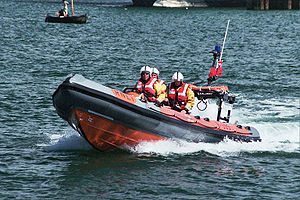The key aspect of sailing is to remain as safe as possible at all times – not only does this reduce the risk involved but it also makes for a much more fulfilling experience.
When dealing with the natural world it’s important to expect the unexpected – and that means being prepared.
A number of factors need to be taken into account, with many of the absolute essentials being taught across various levels of sailing courses.
When it comes to sailing there are seven deadly sins that should be avoided, so if you want to enjoy your sailing experience and get the most from it, here’s what should be considered:
 1. Being underprepared / overconfident
1. Being underprepared / overconfident“Failing to prepare is preparing to fail,” said the great Benjamin Franklin – and he wasn’t wrong.
The same analogy applies to sailing too, as even the most experienced sailors can still get into difficulties if they are not careful.
At the same time, being overconfident in your own abilities is also a big no-no, as a sudden weather change or small mistake could easily have disastrous consequences.
However, when sailing with due care and attention, the process is a lot more straightforward and the whole sailing experience is safer for all concerned.
Those with first aid or survival course experience will at least be trained to deal with the situation should something go wrong, although it is always hoped that it won’t.
This may sound really obvious but ignoring the conditions that you will be sailing in is just asking for trouble.
Checking beforehand and subsequently adjusting courses and time spent on the water is essential to staying safe, and it ensures that sailors of all experience levels stay well away from tricky sailing conditions.
Detailed weather plans can be found on many different internet sites and while their accuracy cannot be guaranteed, they do at least offer an idea of the sort of conditions that should be expected.
So many different sailing courses are available for those learning how to sail that there really is no excuse for taking to the water without the necessary skills.
Those wanting to learn more advanced sailing skills can do so with RYA day skipper courses, while there are even courses that deal with the use of motorboats and yachts.
Many of the courses are structured for people of varying levels of ability, so that advanced sailors can focus on individual aspects of sailing, while beginners can gain a more generalised overview.
A float plan is not a requirement for sailing but it can be exceptionally useful should anything go wrong.
Essentially it would be given to a friend or relative with the intention that a search could begin if they had not returned by when was expected.
It will include a rough course of where a sailor is going, as well as the time they leave and an estimated return – of course the friend or relative should be informed of a safe return as well.
A float plan will also include details of who is aboard to ensure that everybody is accounted for in the event of an accident.

All safety elements of sailing are in place for a reason and many of these points will be addressed on a continual basis when learning to sail.
That is because it can only take one small mistake or stupid action to put the lives of an individual and/or others in a boat at risk.
While it is safe to assume that most people will take safety considerations into account, there should not come a time when a sailor considers cutting corners, as this could end very badly.
In order for a boat to be stable on the water it is essential that it is loaded in the proper way.
This is vital in terms of preventing it from capsizing – the most common way that sailors end up getting into serious difficulty.
Too many people and too much equipment in a boat can mean it is overloaded, placing great pressures on the vessel while not enough weight can mean it is too lightweight when on the water.
This can increase the likelihood of the vessel capsizing, especially in stronger waters.
As has already been mentioned, the natural world can pose a great many threats and all of these risks must be taken seriously.
Sailing can be a highly risky venture if people are not entirely focused on what they are doing, making focus an important part of the sailing experience.
Have you ever got into difficulties whilst out on the water? Let us know in the comments below.